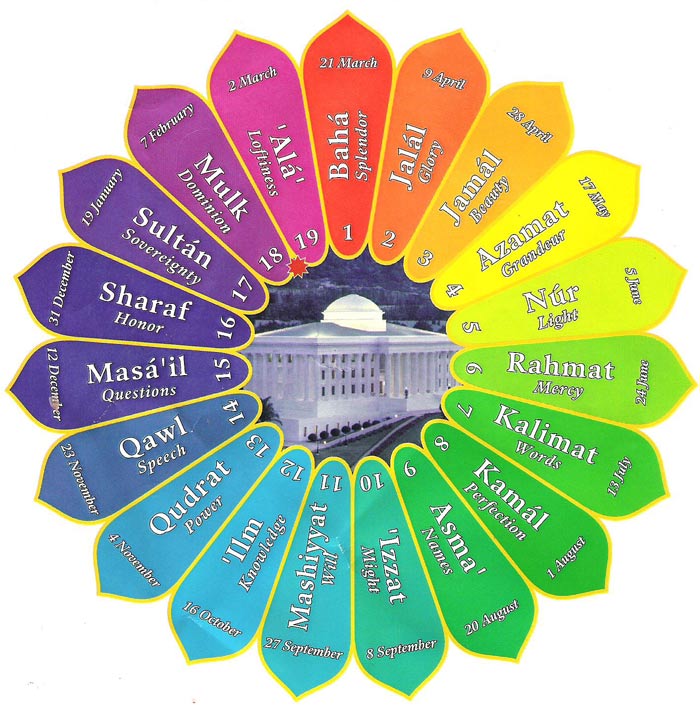The views expressed in our content reflect individual perspectives and do not represent the authoritative views of the Baha'i Faith.
Time orders life, or so it seems – at least most of the time. How often do we check the time, mark our calendars, plan our schedules? Pretty much all the time! Time matters, and so much is a matter of time.
But in its own way the soul measures progress, too, and spiritual time keeps both.
The Baha’i 19-Day Feast transforms time. Time is mundane, worldly, associated with material reality. The Bab created a new calendar. This “Wondrous (Badi‘) Calendar” – known today as the Baha’i Calendar, transforms time by rendering ordinary time into “sacred time.”
The notion of sacred time is highly significant in the study of religion. Scholars have devoted much time and energy to the topic of sacred time. Sacred time adds a spiritual dimension to ordinary time, because time is physical, and sacred time is metaphysical. Sacred time is the ultimate “quality time.” Sacred time invests and endows regular time with purpose. Time gives us the opportunity to progress by growing spiritually, by maturing, by serving, and by becoming transformed in the process. The Baha’i Faith, after all, is all about individual and social transformation.
The Bab’s new calendar transforms time into a supramundane, spiritual experience. The Oxford English Dictionary defines “supramundane” as: “Of or relating to a region above or beyond the earthly world; otherworldly, divine. Also: above or superior to worldly affairs.” The latter sense applies here – in the here and now. To make time sacred is to render it divine in nature and in purpose. So how does the Bab do this? Professor Nader Saiedi explains:
The Bab turns the entire concept of time into a process of spiritualization. Time becomes literally filled with God. This process is most evident in the new calendar introduced in the Persian Bayan. In the first paragraph of the gate dealing with the calendar, the Bab explains the symbolic meaning of His new organization of time. – Nader Saiedi, Gate of the Heart, p. 327.
Nowhere is the notion of sacred time so evident as in the case of sacred calendars. Most world religions have adopted a sacred calendar in one form or another. Recognizing this religious phenomenon, the Universal House Justice, the international Baha’i council that oversees the affairs the Baha’i world, has noted:
The adoption of a new calendar in each dispensation is a symbol of the power of Divine Revelation to reshape human perception of material, social, and spiritual reality. Through it, sacred moments are distinguished, humanity’s place in time and space reimagined, and the rhythm of life recast. – The Universal House of Justice, To the Bahá’ís of the World, 10 July 2014, www.bahai.org/r/849502174
Baha’u’llah, by adopting the calendar that the Bab created, intended that not only the structure of the calendar itself be implemented as a practical matter for tracking and documenting time, but for fulfilling a spiritual purpose as well:
Speaking of “this Name which overshadoweth the whole of creation” (¶ 127), He [Baha’u’llah] approves the Babi calendar, which was designed to make the flow of time a symbol of the divine names, its nineteen months beginning with and returning to “Baha.” Life and the passage of time thereby become a constant remembrance of the universal revelation of God, a reflection of divine Beauty, and a manifestation of the spiritual journey. – Nader Saiedi, Logos and Civilization: Spirit, History, and Order in the Writings of Baha’u’llah, pp. 287–288.
The Baha’i calendar assigns names to each day, month and year, and those names – Grandeur, Glory, Beauty, Light, etc. – reflect the spiritual attributes of the Creator. At the present time, most Baha’is don’t routinely use the Baha’i names for weekdays, days of the month, and names of years. The names of the 19 Baha’i months in each year, however, play an important role in Baha’i devotional life. Often the host of a Baha’i Feast chooses the devotional readings and prayers for that gathering according to the name, or attribute, of the particular Baha’i month. Typical Feast readings for the Baha’i month of “Honor,” for instance, might feature a selection of Baha’i scriptures that focus on the word “honor” as a notable feature.
There is no requirement to do so, and no binding precedent indicating that this is how the readings for a given Baha’i Feast should be chosen. Even so, it’s a very popular practice among Baha’is. The result is that each Baha’i community which follows this practice will meditate on the godly attribute of “Honor” during the Feast of Honor once a Baha’i year. So the names of each of the nineteen Baha’i months receive considerable attention during the devotional portions of Baha’i Feasts around the world. In this way, the Bab continues to spiritually inspire and edify, as part of his living legacy.
The names for the Baha’i months are spiritual attributes of God, even though God transcends all names and attributes. But the same spiritual qualities can be manifested – to a far lesser degree, of course – by each one of us. To explain how this is possible, please take a quick look at this series of articles: “Transforming Time: Turning Godly Perfections Into Goodly Actions” (40 articles).
Because the Bab’s unique calendar functions as a part of his living legacy in Baha’i devotional life today, let’s close with a passage from the Baha’i writings on the meaning of the spiritual virtue of honor, which comprises a wide range of noble qualities and actions that each one of us can potentially manifest:
Then it is clear that the honour and exaltation of man cannot reside solely in material delights and earthly benefits. This material felicity is wholly secondary, while the exaltation of man resides primarily in such virtues and attainments as are the adornments of the human reality. These consist in divine blessings, heavenly bounties, heartfelt emotions, the love and knowledge of God, the education of the people, the perceptions of the mind, and the discoveries of science. They consist in justice and equity, truthfulness and benevolence, inner courage and innate humanity, safeguarding the rights of others and preserving the sanctity of covenants and agreements. They consist in rectitude of conduct under all circumstances, love of truth under all conditions, self-abnegation for the good of all people, kindness and compassion for all nations, obedience to the teachings of God, service to the heavenly Kingdom, guidance for all mankind, and education for all races and nations. This is the felicity of the human world! This is the exaltation of man in the contingent realm! This is eternal life and heavenly honour! …
As the compassionate Lord has crowned the head of man with such a refulgent diadem, we must strive that its luminous gems may cast their light upon the whole world. – Abdu’l-Baha, Some Answered Questions, newly revised edition, pp. 89–90.

















Comments
Sign in or create an account
Continue with Googleor